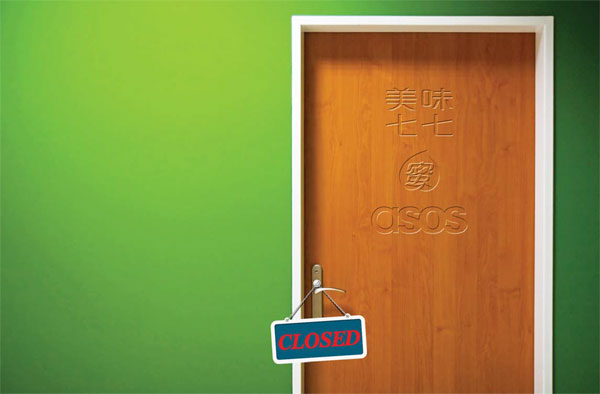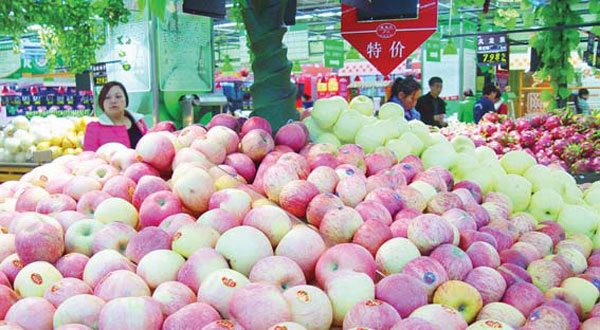Too hot to handle
Updated: 2016-06-03 08:20
By Wang Ying(China Daily Europe)
|
|||||||||
Companies eye a piece of the e-commerce pie in China, but many are getting their fingers burned
It's no secret that China is the world's largest e-commerce market, considering the staggering amounts of money shoppers spend online.
The National Bureau of Statistics says online retail transactions hit 3.87 trillion yuan ($589 billion; 530 billion euros) last year, a 33 percent increase on 2014.

|
Shoppers pick out fruit at a supermarket in Beijing. [Photo by A Jing / For China Daily] |
Yet while the country may be the global leader in e-commerce, online sales contribute just 11 percent of its total retail sales, according to Nielsen's market intelligence. However, the company estimates that online sales are growing at a rate of 53 percent year-on-year, an indication of huge market potential.
Naturally, companies are rushing to set up internet platforms to sell their products, but not all of them have tasted success, including some big players.
"China's e-commerce market is evolving very quickly, and it is difficult for an internet platform to keep up without strong China-centric funding and resources," says Ben Cavender, principal of China Market Research Group.
"There are tremendous opportunities for e-commerce to grow further, but right now it is still at an early stage. In three to five years, two to three dominant players will emerge from the competition."
Metao, a Chinese cross-border e-commerce provider started in October 2013, reportedly faces imminent closure despite receiving $35 million in investment in 2014. One client told Economic Information Daily that she had not received an order placed a month ago, and that her calls to the customer service hotline had gone unanswered.
On April 7, suppliers of grocery platform Yummy77 gathered in front of its offices in Shanghai to demand payment only to discover that it had gone bankrupt, Xinhua News Agency reported.
Yummy77, officially launched in May 2013, was seen as a leading grocery e-commerce company due to its prompt delivery services and generous discounts. In May 2014, Amazon China made an investment of $20 million, swelling its evaluation to $100 million.
Li Chengdong, an independent e-commerce strategy analyst, says the fall of the site was largely due to factors such as the lavish spending on the construction of warehouses and a logistics network, an inexperienced management team, and the fact that buying fruit and vegetables online is still a novelty to most Chinese consumers.
It also did not help that competition is stiff. Data from Forward (Qianzhan) Intelligence Co Ltd shows the value of China's fresh grocery e-commerce market expanded from 1 billion yuan in 2011 to 56 billion yuan last year. The consultancy projects the market to reach 128 billion yuan by 2018. The promising outlook has attracted some big players to vie for a slice of the pie, including Alibaba, Yihaodian and JD.com.
To make matters worse, buying fresh produce online costs on average twice what it does at a brick-and-mortar store because of the costs to store and transport it, according to consultant company Analysys.
Li says most e-commerce sites in China that sell fresh produce are struggling to make ends meet, and that having adequate financing is key to survival.
British online fashion and beauty retailer ASOS also met its Waterloo in China on April 7, announcing that it will discontinue local operations. CEO Nick Beighton says the company will continue to do business in China via its main website, and that the decision was made to "serve our growing customer base in China in a more efficient and less costly manner".
Despite the growth in online apparel sales in China - the China National Textile and Apparel Council says 723.2 billion yuan in apparel was traded online last year, up 20 percent on 2014 - ASOS has posted a total loss of 8.6 million euros ($9.5 million) since entering the Chinese market in 2013. In contrast, the brand boasts an average growth rate of 20 percent in the international market.
Li believes the company's poor performance in China was caused by an unsuccessful marketing campaign that failed to reach its target audience.
Market analysts Cavender predicts more players will exit China's competitive e-commerce scene unless they can set themselves apart from their competitors.
"While e-commerce is growing quickly, it's a very competitive market with a lot of online stores fighting for customers," he says. "Because they have to offer both a high level of service and competitive prices in order to attract customers, margins are very thin.
"Companies need to respond to consumer need, both in terms of brands and products, and service quality. If a site has the same products as everyone else and cannot deliver faster or offer something different, consumers will just choose the cheaper, more established option."
wangying@chinadaily.com.cn
Today's Top News
Eyeing the goal in European football
Suddenly, it's a small world
China looking forward to trade talks with EEU: MOC
Russia to promote EAEU-China economic cooperation
AIIB 'set to earn international trust, credibility'
EIB and AIIB to strengthen cooperation
Some 13,000 migrants saved, over 700 dead
Economists urge go-slow on EU's anti-dumping
Hot Topics
Lunar probe , China growth forecasts, Emission rules get tougher, China seen through 'colored lens', International board,
Editor's Picks

|

|

|

|

|

|








